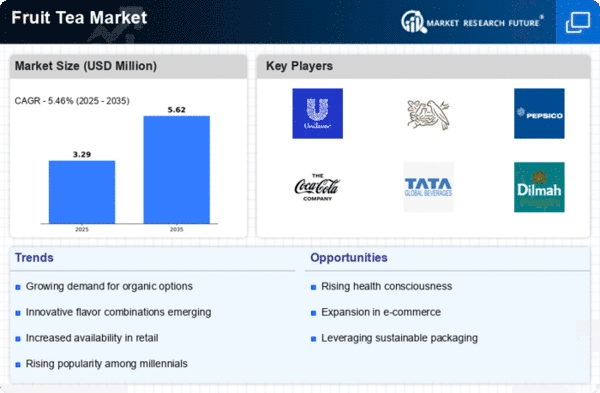Market Analysis
In-depth Analysis of Fruit Tea Market Industry Landscape
The Fruit Tea Market is characterized by a dynamic interplay of factors that influence both the supply and demand for fruit-infused beverage options. One of the primary drivers shaping market dynamics is the global shift towards healthier lifestyles and the increasing demand for natural and flavorful alternatives to traditional beverages. Fruit tea, with its combination of refreshing flavors and potential health benefits, has gained popularity among consumers seeking a tasteful and nutritious beverage option. This growing consumer preference for healthier choices has spurred the expansion of the fruit tea market. The surge in fruit tea consumption is attributed to its health-enhancing properties, contributing to heightened immunity, reduced cholesterol levels, and increased metabolism. This array of health benefits associated with fruit tea is a key driver behind the expanding market. Growing awareness among consumers regarding the positive impact of fruit tea on well-being is significantly influencing market dynamics. Additionally, the increasing popularity of iced fruit tea is noteworthy, positioning it as a wholesome substitute for sugary and caffeinated cold beverages. This shift in consumer preferences towards a healthier lifestyle is propelling the demand for fruit tea.
Fruit tea's positive impact on immunity, cholesterol management, and metabolic functions is fostering a broader acceptance of this beverage among health-conscious consumers. The market is witnessing a notable trend as individuals seek beverages that not only provide refreshment but also contribute to their overall health and well-being. The appeal of iced fruit tea as a nutritious alternative further underscores the evolving preferences in the beverage industry, where consumers are actively choosing options that align with their health goals. This growing inclination towards fruit tea reflects a broader trend towards wellness-focused choices, driving sustained demand and market growth. Geographical factors play a crucial role in influencing the dynamics of the fruit tea market. Different regions around the world have diverse fruit preferences and consumption habits, leading to a wide variety of fruit tea blends catering to local tastes. For example, regions with abundant citrus fruit production may see a prevalence of citrus-infused fruit teas. The availability of locally sourced fruits impacts the flavors offered in the market, creating a mosaic of options that cater to the diverse palates of consumers worldwide.
Changing consumer preferences and the demand for diverse flavor experiences contribute significantly to the market dynamics. Fruit tea's versatility allows for the creation of an extensive range of blends, combining fruits, herbs, and spices to achieve unique taste profiles. As consumers seek novel and exotic flavors, the fruit tea market responds with innovative combinations and product offerings. This constant innovation not only keeps consumers engaged but also fosters competition among market players vying to offer the most appealing and distinct fruit tea options.
The emphasis on health and wellness trends further shapes the dynamics of the fruit tea market. Many consumers view fruit tea as a healthier alternative to traditional sugary beverages. The infusion of natural fruit flavors provides a hint of sweetness without the need for added sugars or artificial ingredients. The market responds to this health-conscious trend by introducing low-calorie and organic fruit tea options, aligning with consumer preferences for clean and transparent ingredient lists.
Market dynamics are also influenced by the evolving landscape of distribution channels. The rise of e-commerce and online platforms has expanded the reach of fruit tea products, enabling consumers to access a diverse array of options from the comfort of their homes. This shift in consumer behavior has led to changes in marketing strategies, packaging formats, and the overall retail experience. Companies that adapt to these shifts in distribution channels are better positioned to reach a wider audience and capitalize on the growing demand for fruit tea.
Challenges faced by the fruit tea industry include sourcing quality fruit ingredients, ensuring consistency in flavor profiles, and addressing environmental concerns related to packaging. Overcoming these challenges requires collaborations with reliable suppliers, investment in quality control measures, and the adoption of sustainable packaging solutions.


















Leave a Comment